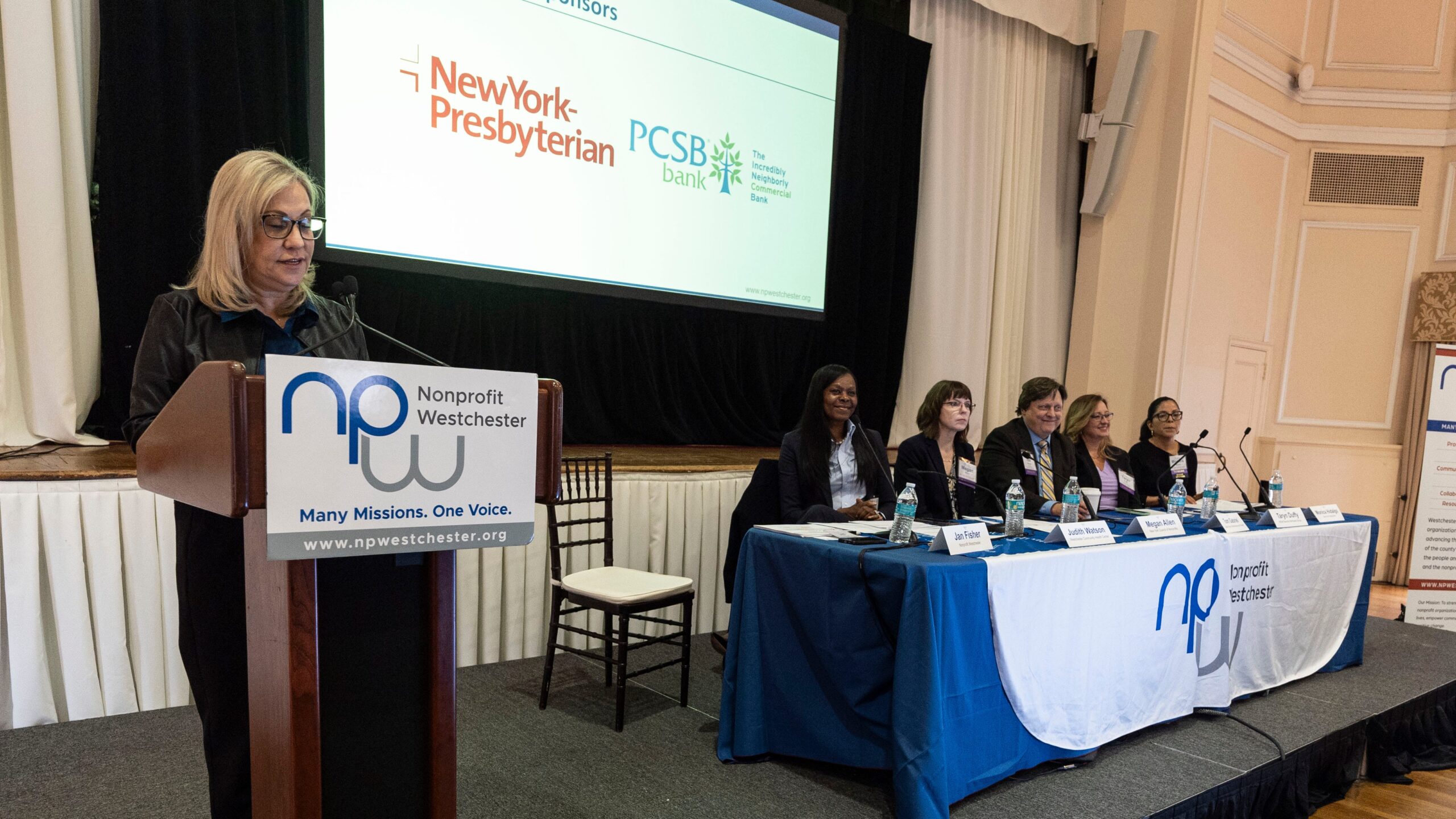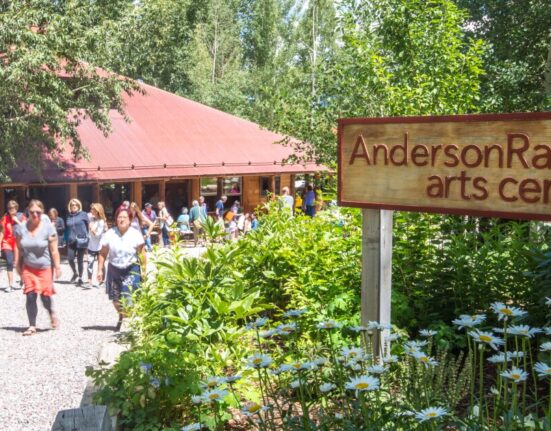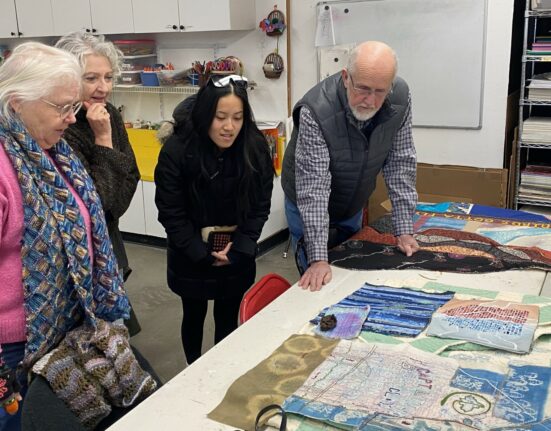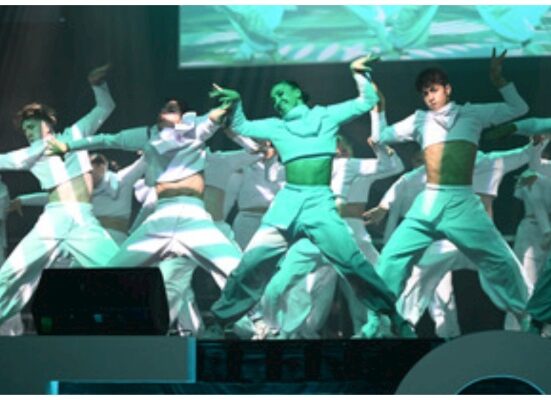Westchester nonprofits discuss staying strong amid threats to funding
Two hundred people attended a panel discussion on how nonprofits can remain strong amid threats to funding by the federal government.
- DEI programs are being targeted by the White House, but ArtsWestchester is all-in on diversity, equity and inclusion.
- The arts-funding group will give $30,000 in grants to a ballet committed to access and inclusion, and a bilingual singer-songwriter who helps families bridge cultures
The president has taken control of the Kennedy Center for the Performing Arts and its programming.
Government websites are being scrubbed of the accomplishments of Black trailblazers, along with words that the algorithm has been told are related to diversity, equity and inclusion.
A photograph showing the plane that carried the first atomic bomb was pulled from a government website because it was the Enola Gay and the algorithm didn’t understand that Enola Gay was pilot Paul Tibbetts’ mother’s name.
This is all prelude and the very real present in which ArtsWestchester, an umbrella group for dozens of arts groups and artists in Westchester and Rockland, finds itself this week. The grant-giving nonprofit will on April 9 honor an organization and a singer-songwriter for their work in diversity, equity and inclusion.
White Plains-based Ballet des Amériques, which champions ballet for all, will receive $25,000, and Croton-based Peruvian singer-songwriter Flor Bromley — whose work unites families while promoting environmental justice — will receive $5,000.
‘Allyship looks like a lot of things’
ArtsWestchester CEO Kathleen Reckling will present the awards at a luncheon. Past honorees include Rehabilitation Through the Arts, the prison-arts program that was the focus of the Oscar-nominated film, “Sing Sing.”
“It certainly sets a bar for what we all do in the field in terms of providing access to transformative experiences through the arts,” Reckling said late last week. She acknowledged the tumultuous moment, and doubled down on supporting groups and individuals whose work touches on DEI, as hot a hot-button topic as one is likely to find.
“Allyship looks like a lot of things, but it’s definitely showing up for your community and being there as a partner in all weather,” Reckling said. What set the honorees apart, she said, was the caliber of their work, but also something else.
“The adjudicators look to see that these commitments to equity, inclusion and accessibility are really embedded in the DNA of the organization,” she said.
Ballet des Amériques: ‘It’s a country of diversity’
“Ballet des Amériques is committed to making ballet an accessible dance form,” Reckling said. “They’re very intentional about the programming that they do to expand access. One of the programs aims to de-gender ballet and encourage participation by young boys in the art form.”
Carole Alexis founded Ballet des Amériques in 2011 in Port Chester. It is now in White Plains and New York City and has a professional multicultural dance company as well as a pre-professional ballet conservatory.
“Equity and inclusion and accessibility and diversity are essential to the world, they’re essential to peace in the world, essential to the advancement of any nation,” Alexis said. “We are diverse, not because we try to be that, but because that’s the way the world is and especially the United States. It’s a country of diversity.”
Alexis acknowledges the headwinds that DEI efforts face.
“This movement right now that is fighting DEI has this nostalgia or this misunderstanding of what culture is,” said Alexis, who was raised in Martinique and in Africa. “I am a believer of hope. I’m doing a ballet that is more taking energy in joy. Joy is the food that you need to never fall into fear and despair.
“It can be difficult, but it has been difficult in the past. We should continue to dance our voices, sing our voices, write our voices. We need to continue,” she said.
Flor Bromley: “It’s not gonna stop us from creating’
Reckling said Flor Bromley’s work is about representation. The Peruvian singer-songwriter lives in Croton-on-Hudson, and creates events where families can learn songs that celebrate their different cultures.
“Having songs and family-accessible music that is offered in multiple languages that reflects different cultures and gives that prominence is very important,” Reckling said. “Her programming and work also draws attention to environmental justice and how important working towards environmental justice is for our communities.”
Bromley said she’ll use the $5,000 grant “to make more music, to make more shows, and to bring the arts available for all families and all ethnicities around.”
To be an artist is to see the glass — once you create the glass — as half full, if not overflowing. It is no surprise, then, that Bromley is already looking past the uncertainty of the moment.
“I think this pushback is definitely a detriment, but at the same time, I think we will all rise like (the) phoenix, and I think we will find new spaces and new places that will still be able to use it,” she said. “Diversity and inclusion and equity, it’s all around us and we cannot deny it. So even if opportunities are not going to be as available, I think people will still need it. It’s not gonna stop us from creating.”
She is also looking forward to May and the release of a new album, “HERstory,” which highlights women from every continent as new role models for girls of all ages. On it is a song called “Trailblazing,” which includes a couplet that Bromley said is helping her get through these dizzying days.
“Women have been trailblazers in time, knowing their destiny is theirs to design.”
ArtsWestchester’s Reckling: ‘A time of a lot of uncertainty’
It’s undeniable that there’s a new climate surrounding the arts, a climate that Reckling’s organization is helping artists and nonprofits to navigate.
“It’s certainly a time of a lot of uncertainty,” she said. “While there’s a lot swirling around us and we’re not quite sure what the funding landscape looks like — and some of these executive orders really feel like they’re striking at the heart of what we do — we remain very committed to doing the work that’s important to us as artists and creative and arts professionals.”
ArtsWestchester and the National Endowment for the Arts are both marking 60th anniversaries this year, a “shared history” that Reckling said is important. Reckling became ArtsWestchester’s CEO last July, succeeding longtime CEO Janet Langsam.
Asked what message the administration is sending with new policies and executive orders, Reckling said: “I think they recognize the power of the arts as a mode of expression and communication. Some of these executive orders feel like they’re trying to direct what that should look like, as opposed to having truly open artistic expression and freedom of artistic expression.”
That climate has made for anxious days in the nonprofit and art worlds, said Reckling, who noted with a laugh that she keeps a bottle of Tylenol within ready reach. But she said her role is to remain steadfast.
“The National Endowment and Arts Westchester are resources for organizations when we navigate moments like this,” she said.
Government, an arts lifeline in COVID era, is pulling back
Artists and their patrons are only just coming out of the COVID storm, one that tested everyone but proved something about artists.
“We were able, as a sector, to pivot during COVID, and we learned to adapt,” Reckling said. “I think one of the hallmarks of artists and arts workers, creative workers, is that we are adaptive and resilient. As dizzying and as challenging as this is, I think we have an opportunity to really work together as a sector to harness what we do so well, which is adapt, be creative and help solve the challenges of the moment.”
During the pandemic, many artists and venues were buoyed by the Save Our Stages Act that provided $14.5 billion to keep artists afloat. A paradigm shift in Washington, D.C., has shut off the infrastructure of funding for the arts.
The bulk of ArtsWestchester’s funding comes from Westchester County and a significant amount from New York state. Wednesday’s luncheon arrives without a state budget in place. The Senate and Assembly have recommended funding the New York State Council for the Arts at $208 million. Reckling said she hopes Gov. Kathy Hochul agrees to that level of funding, which would help organizations navigate impending cuts at the federal level.
ArtsWestchester also receives about $40,000 a year from the National Endowment for the Arts, a pipeline that might be shut off.
ArtsWestchester is also at the end of a two-year, $190,000 grant from the Institute of Museum and Library Services to fund the Westchester heritage ambassador program, which trains people to create cultural programming for their communities. There is $60,000 that hasn’t been disbursed and was paused last week when the Trump administration put the IMLS staff on administrative leave, freezing those funds.
Millions in grants may simply go away
Also in jeopardy are in-school art residencies funded through the imperiled U.S. Department of Education, which the administration has targeted for deep cuts and layoffs, if not closure.
“That’s where it really hurts communities because in some cases, those artist residencies may be the only opportunity children in those school districts have to access the arts,” Reckling said.
She said IMLS and the National Endowment for the Humanities between them have granted about $3.4 million to arts and cultural organizations in Westchester over the last three years.
“I think we’re all looking at our business models to see how do we diversify our income, what sources can we go to to make certain programs less dependent on federal funds,” Reckling said.
Reckling said there’s genuine concern that programming could impact the 501(c)(3) status of arts group.
“I think everyone’s being very mindful about how we talk about our programming and what we do,” she said. “But I think organizations are also trying to make sure that they don’t lose their identity and that they remain true to their mission.”
Art for expression and art for display
Asked if the challenges to diversity, equity and inclusion will affect the kind of art that is created, Reckling thought long before answering.
“I think there is an opportunity for there to be some great art created. Artists work well under pressure and in response to challenges,” she said.
“There’s the art that is being made and there’s the art that’s being shown. I think there’s an opportunity for really great art to be made that reflects this moment,” Reckling said. “I think the challenge for a lot of institutions is deciding what gets shown.”
Alexis said there has always been a push-and-pull between superficial art and art that goes deeper.
“Because of this entrance of social media and this tendency to narcissism, art has become too much about entertainment rather than feeding the soul,” Alexis said. “It has a tone of righteousness even if it’s in a politic way, like ‘we are doing the right things and we are the right people.’
“When the challenge comes and the difficulty comes, to me it’s an opportunity to become better. But this kind of art, the pleasing art, has always existed alongside the art that tries to lift the spirit, to feed people, to bring them joy or consciousness and dialogue between each other. It starts with the dialogue, to have the opposite of what we’re feeling right now, which is fear and division.”
Alexis, the ballet teacher who embraces joy in her work, thinks back to something her grandmother often said, when she heard someone complaining about another person.
“My grandmother used to say you need to see the dirty, the bad grass, so we can pull it out. If not, it hides and destroys your garden,” Alexis said. “I feel we’re in a time where we see the bad grass and we can work of cleaning the garden so the beautiful flowers — the art, the education — become stronger than ever.”
ArtsWestchester’s Arts Awards
ArtsWestchester’s Arts Awards honor vision, drive and leadership in the arts community. This year’s awards luncheon will take place at 11:30 a.m., April 9, at the Sonesta White Plains, 66 Hale Ave., White Plains. The honorees: Barbara & Paul Elliot: Patron Award; Paul Adler: Impact Award; John Patitucci: Artist Award; Bethany Arts Community: Sophia Abeles Arts Education Award; Caramoor & Tarrytown Music Hall: Milestone Awards; Kwame Anyane-Yeboa and Anna Sirota: Larry Salley Photography Awards;Ballet des Amériques and Flor Bromley: Advancing Equity Awards
Peter D. Kramer is a 37-year staffer who writes long-form narratives on a variety of topics. His story looking back on the Oak Street fire in Yonkers won a national Headliner Award for outstanding news specials/feature column. Reach him at pkramer@gannett.com.







